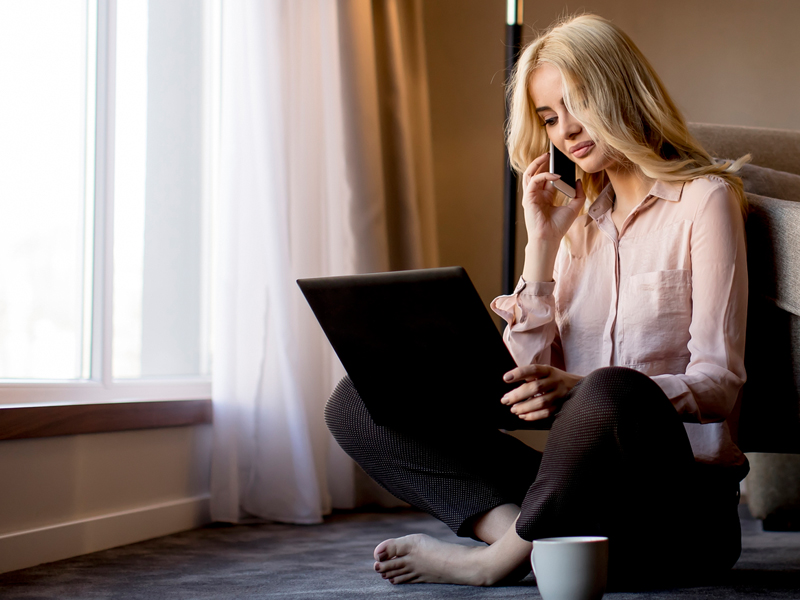Covid-19 has brought world-wide change to the way we interact with people, how we shop, how we conduct business and make purchases, and how we work. While some of these will be short term, working from home has become a major change for millions of people.
New Shortcut Flat Rate
The Australian Taxation Office (ATO) has recognised that working from home has increased personal expenses and has made changes to what and how you can claim your tax deductions this financial year. This new arrangement will allow people to claim a flat rate of 80 cents per hour for all running expenses, such as heating, cooling, electricity, phone and internet. If this flat rate is claimed, no other work-related office expenses may be claimed, such as depreciating assets or occupancy expenses.
Multiple people living in the same house can claim this deduction without needing a dedicated work space or working out and calculating the expenses based on the floor space of your home. A couple living together can claim the same rate. To claim this rate, a diary should be kept which records the number of hours worked from home as evidence of your claim.
Existing Rate
If the flat rate doesn’t suit, you’ll be able to claim using the existing rate of 52 cents per hour, where calculations are made to all or part of the running expenses on your work-related hours. This includes heating, cooling, lighting, and cleaning. If this rate is used, you’ll also be able to claim the extra work-related portion of your phone and internet expenses, computer consumables, stationery and the work-related portion of the decline in value of a computer, laptop or similar device. You’ll need to keep a diary for four weeks which details your hours spent working from home which will then be averaged throughout the year.

Actual Cost Method
The actual cost method can also be used, in which you can claim the actual work-related portion of all of your running costs, cleaning and the decline in value of assets, capital items and office furniture used in your dedicated office space.
You’ll need to record the number of working hours you keep for a representative four-week period in a diary or log book and work out the decline in value of depreciating assets. Other members of your household can be apportioned into these expenses. If you don’t have a dedicated work area, flooring space may be averaged out with the size of your house. Occupancy expenses such as a portion of council rates) may be claimed if running a business from home but may incur capital gains implications.
This method might be more time consuming to calculate, but might yield a better tax return. It’s a good idea to use a tax agent if you claim your deduction in this way.
Working From Home Expenses
The deductions you’ll be able to make if you’re working from home include:
- The cost of using a rooms utilities such as gas and electricity
- Work-related phone calls and internet
- The decline in value (depreciation) of office equipment such as desks, chairs and computers
- The decline in value (depreciation) of curtains, carpets and light fittings
- The cost of cleaning – cleaning products or the cost of a cleaner
- The cost of repair to office equipment, furniture and furnishings
- Small capital items under $300 may be written off immediately without the need for depreciation
- The occupancy expenses such as rent, mortgage interest, insurance and rates (Businesses only)
Download this article: How COVID19 Will Change How You Claim When You Work From Home This Tax Time
Capital Gains Tax Implications
Generally, if you’ve been working from home as an employee, there will be no capital gains tax (CGT) implications for your home, even if you claim home office expenses. If you do claim occupancy expenses as part of running a home business, you don‘t get the full main residence CGT exemption, although you may be entitled to a partial exemption.
Keep Your Receipts
If you’re an employee that works from home, you’ll need to keep your receipts and a diary to explain your working hours and calculations. Diary entries much be kept for a consecutive four week period which will then be averaged out for the year. Itemised phone and internet accounts from where you can identify work-related calls and usage should also be recorded.
Three Golden Rules
To make your claims, the three golden rules still apply:
- The expense must be work-related
- You must have already incurred the expense
- You must be able to prove your expense.
An ITP Tax Accountant will help you work out the most beneficial method to maximise your tax return. ITP Accountants have helped Australian individuals and businesses for 50+ years. Speak to an ITP Accountant who can help you with your individual and business tax, accounting, bookkeeping and key financial advice.
Whilst taking every precaution to stay safe, our Tax Accountants are available during normal business hours to help with any enquiry. Speak with a Professional and see how they can help you today.
Call 1800 367 487, or book online at www.itp.com.au and your tax agent will be in touch to help.
